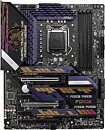- Joined
- Oct 9, 2007
- Messages
- 47,633 (7.44/day)
- Location
- Dublin, Ireland
| System Name | RBMK-1000 |
|---|---|
| Processor | AMD Ryzen 7 5700G |
| Motherboard | Gigabyte B550 AORUS Elite V2 |
| Cooling | DeepCool Gammax L240 V2 |
| Memory | 2x 16GB DDR4-3200 |
| Video Card(s) | Galax RTX 4070 Ti EX |
| Storage | Samsung 990 1TB |
| Display(s) | BenQ 1440p 60 Hz 27-inch |
| Case | Corsair Carbide 100R |
| Audio Device(s) | ASUS SupremeFX S1220A |
| Power Supply | Cooler Master MWE Gold 650W |
| Mouse | ASUS ROG Strix Impact |
| Keyboard | Gamdias Hermes E2 |
| Software | Windows 11 Pro |
Here's the first picture of the MSI MPG Z590 Gaming Force, an interesting new product from MSI slotted in its upper-mid tier MPG line of motherboards. This Socket LGA1200 motherboard based on the Intel Z590 chipset is characterized by a Hip Hop design language that's a break away from the company's other MPG Z590 motherboards, with a dash of neon-noir colors. A pair solid ridged heatsinks cool the board's 16-phase CPU VRM. Another set of three heatsinks cover its three M.2 NVMe slots, one of which is PCIe Gen 4 and wired to the LGA1200 socket, and the other two to the Z590 PCH.
Expansion slots on the MPG Z590 Gaming Force include two PCI-Express 4.0 x16 (x8/x8 with both populated), an x16 (electrical PCI-Express 3.0 x4) slot that's wired to the PCH, and a pair of x1 slots. The rest of the board's feature set appears to roughly match the MPG Z590 Gaming Carbon, including a 6-pin PCIe power input to supplement the two 8-pin EPS and 24-pin ATX power inputs, POST debug readout, a fairly premium onboard audio solution, and other connectivity that possibly includes 2.5 GbE.

View at TechPowerUp Main Site
Expansion slots on the MPG Z590 Gaming Force include two PCI-Express 4.0 x16 (x8/x8 with both populated), an x16 (electrical PCI-Express 3.0 x4) slot that's wired to the PCH, and a pair of x1 slots. The rest of the board's feature set appears to roughly match the MPG Z590 Gaming Carbon, including a 6-pin PCIe power input to supplement the two 8-pin EPS and 24-pin ATX power inputs, POST debug readout, a fairly premium onboard audio solution, and other connectivity that possibly includes 2.5 GbE.

View at TechPowerUp Main Site


 little guy to show what I think of this abomination of a motherboard
little guy to show what I think of this abomination of a motherboard  this person.
this person.

 I didn't have a DIY PC back then, but that board reminds me of the eccentricity of computer hardware in the 90's early 2000. That might just be nostalgia, but I found that they had a certain charm.
I didn't have a DIY PC back then, but that board reminds me of the eccentricity of computer hardware in the 90's early 2000. That might just be nostalgia, but I found that they had a certain charm.  But having it only 5 times is really unacceptable.
But having it only 5 times is really unacceptable.
